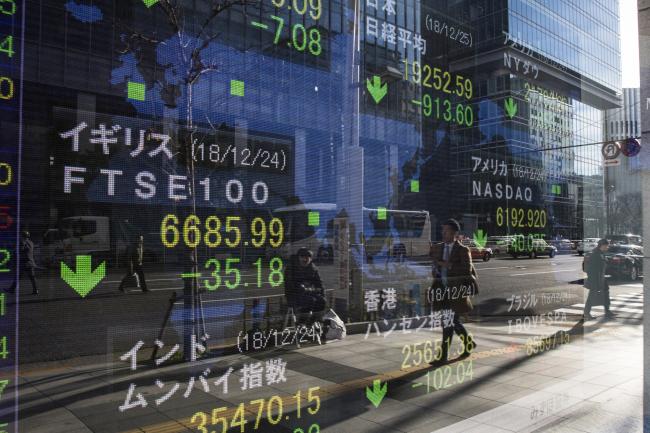(Bloomberg) -- The world economy risks remaining weak for a while longer.
On Friday alone, reports showed the slowest U.S. hiring in more than a year, a slump in Chinese exports and an unexpected decline in German factory orders.
With economies already undershooting expectations by the most since 2013 and the OECD slashing its forecasts, worries are mounting that the recent slowdown will last for longer, although recession fears for now remain limited.
The soft patch puts the U.S. and China under pressure to settle their trade war, which has bludgeoned sentiment, and leaves central banks needing to keep monetary policy looser than they were planning into this year.
Such forces may still prove enough to drive a pickup and next week witnesses further health checks ranging from retail sales data in the U.S. to industrial statistics from China and the euro-region.
“The trends in the global economy have certainly concerned markets,’’ said Philip Shaw, chief economist at Investec in London. “It’s material enough to make a difference to the policy outlook.”
The week ended with news that U.S. payrolls grew just 20,000 in February, way below the 180,000 median forecast in a Bloomberg survey of economists.
Deutsche Bank (DE:DBKGn) is already warning the U.S. economy could grow less than 1 percent this quarter and the bout of labor market weakness will sew worries about the spending power of consumers. On Monday in Washington, the government will release retail sales data for January, after December witnessed the worst slump in nine years.
Elsewhere, exports from China tumbled almost 21 percent in February, the most in three years, while German factory orders unexpectedly dropped 2.6 percent in January, the most since June.
That was just one day. Manufacturing purchasing manager indexes are in contraction territory in China, Japan and the euro area, where there’s mounting concern that the bloc’s economy and markets risk repeating Japan’s lost decades of growth.
There are caveats. U.S. wage gains were the fastest of the expansion in February, and JPMorgan Chase & Co (NYSE:JPM). predicts salaries in rich nations will start advancing by more than 3 percent this year. Financial conditions have also turned more relaxed after tightening into the end of last year, with the MSCI World Index of stocks up almost 9 percent in 2019.
“There’s a case that as we move through this that growth will pick up in the second half of the year,” said David Hensley, director of global economics at JPMorgan in New York. “There are supports to keep things from getting too weak.”
Much will depend on whether Presidents Donald Trump and Xi Jinping can resolve their trade dispute, clearing a fog of uncertainty that’s stopping businesses from investing and hiring. If the U.K. can avoid tumbling out of the European Union without a divorce deal, that would also help.
Trump postponed an increase in tariffs that had been scheduled to be imposed on China this month, but no date has been set for the two leaders to meet and much remains unsettled. Confidence that differences will narrow is one reason Morgan Stanley (NYSE:MS) economists say this quarter will mark the trough of the global slowdown.
Another case for optimism that the worst may soon be over is that some governments and central banks are starting to dole out aid. The problem there is that they will then have less firepower to deploy if growth really falters.
China’s government this week announced a cut to its value-added tax of as much as 800 billion yuan ($119 billion) as it lowered its goal for growth to a range of 6 percent to 6.5 percent for 2019. That’s down from about 6.5 percent last year.
And the European Central Bank became the first of the major central banks to unveil more stimulus in the form of new cheap loans for banks, which came alongside a commitment not to raise interest rates until 2020.
In the U.S., Federal Reserve Chairman Jerome Powell speaks on Friday night after he and colleagues recently paused their campaign of interest-rate hikes. New York Fed President John Williams (NYSE:WMB) said this week that he and colleagues can afford to “wait” and watch incoming data.
What Bloomberg’s Economists Say
“This is a moment of heightened uncertainty for global growth. A Fed pause, trade truce, and China stimulus are all reasons for optimism. From U.S. jobs to China exports, the most recent data paint a more pessimistic picture. We continue to expect stabilization in the second quarter. Risks to that call are tilted to the downside.”
Tom Orlik, chief economist
